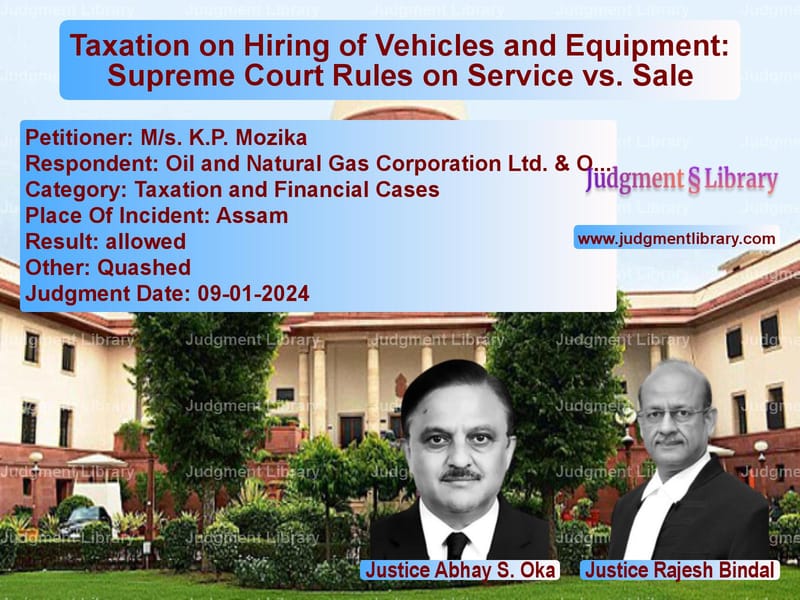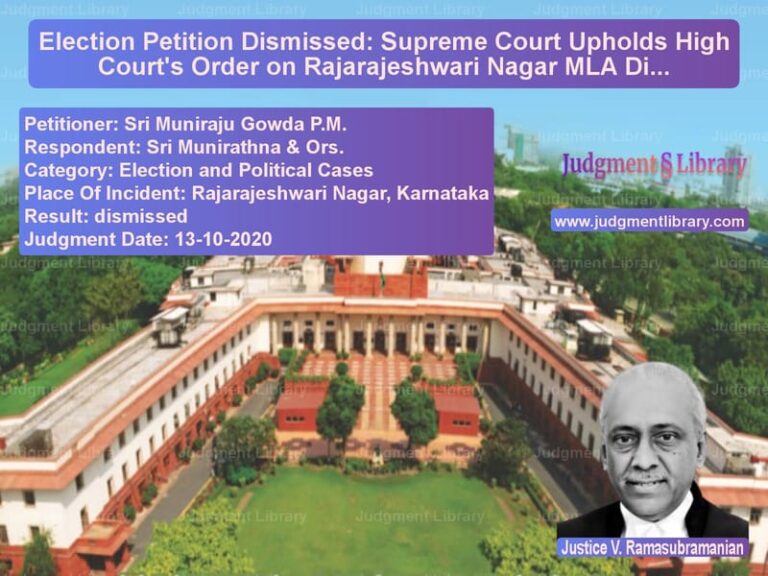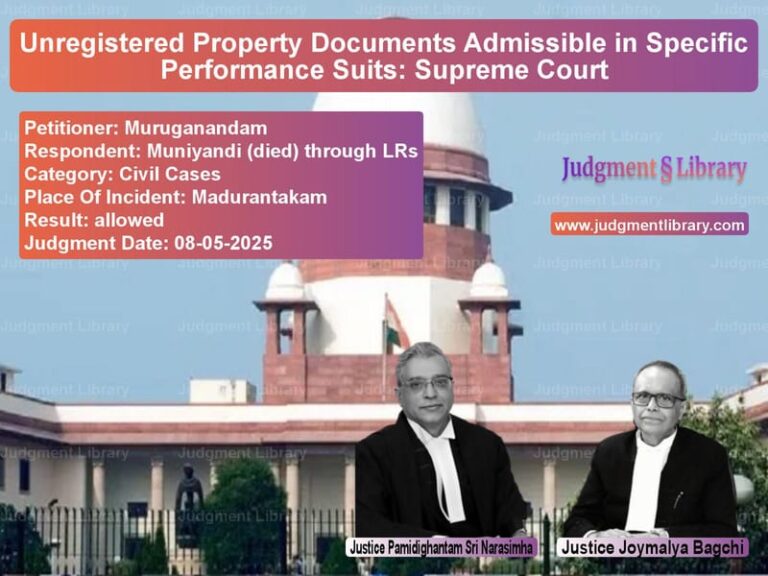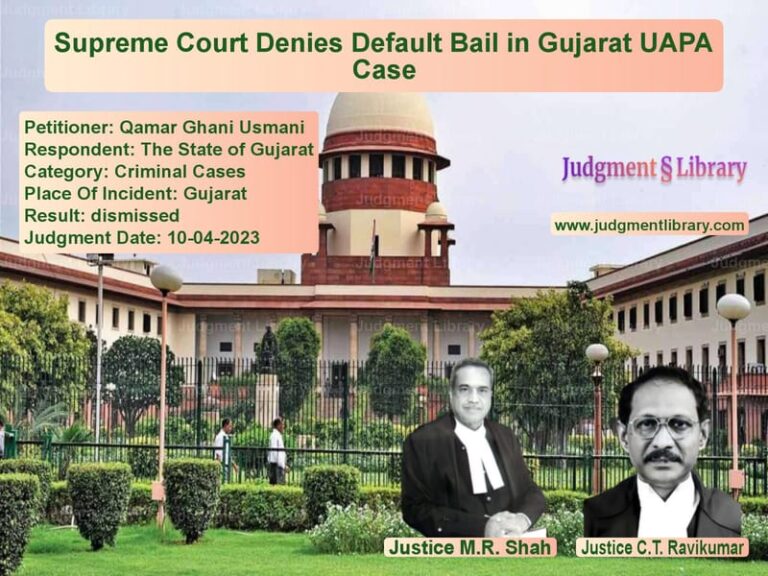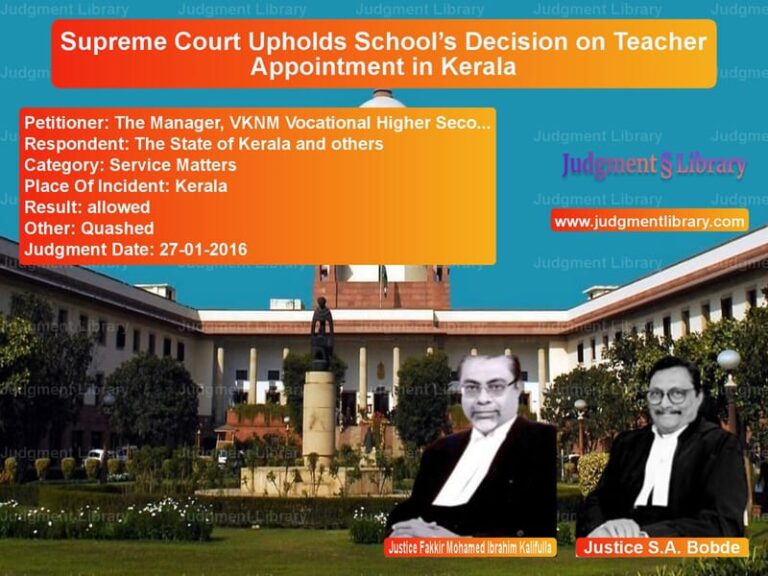Taxation on Hiring of Vehicles and Equipment: Supreme Court Rules on Service vs. Sale
The case of M/s. K.P. Mozika vs. Oil and Natural Gas Corporation Ltd. & Ors. deals with a crucial question in taxation: whether contracts for hiring motor vehicles and equipment constitute a sale (and therefore subject to VAT) or a service (subject to service tax). The Supreme Court ruled that such contracts do not involve the transfer of the right to use goods, making them taxable under service tax rather than VAT.
Background of the Case
The dispute arose under the Assam General Sales Tax Act, 1993 and the Assam Value Added Tax Act, 2003. The appellants, including M/s. K.P. Mozika, entered into contracts to provide various motor vehicles such as trucks, trailers, tankers, buses, scrapping winch chassis, and cranes to Oil and Natural Gas Corporation (ONGC) and Indian Oil Corporation Limited (IOCL). The question before the Court was whether such contracts constituted a ‘sale’ under Clause 29A(d) of Article 366 of the Constitution of India, making them liable for VAT, or whether they were a service and thus liable for service tax.
Legal Issue
The key legal issue in the case was:
- Whether hiring out vehicles and equipment under contracts amounted to a ‘transfer of the right to use goods’ as per Clause 29A(d) of Article 366 of the Constitution, which would make it subject to VAT.
- Whether these transactions were instead a ‘service’, making them liable for service tax under Section 65(105)(zzzzj) of the Finance Act, 1994.
Arguments by the Appellants
The appellants argued that:
- The contracts did not transfer the right to use the vehicles or equipment; rather, they provided a service.
- The ownership and control of the vehicles remained with them at all times.
- The contracts specifically stated that they were for providing services, not transferring the right to use.
- ONGC and IOCL had no control over how the vehicles or equipment were operated.
- Since the transactions involved providing manpower and maintaining the vehicles, they could not be classified as a sale.
Arguments by the Respondents (State of Assam)
The State of Assam contended that:
- The contracts effectively transferred the right to use vehicles and equipment.
- ONGC and IOCL had exclusive possession and control over the hired equipment for the duration of the contract.
- The agreements were structured in a way that met the criteria for a deemed sale under Clause 29A(d) of Article 366.
- VAT was correctly imposed on these transactions as they involved the ‘transfer of the right to use goods’.
Supreme Court’s Key Observations
The Supreme Court analyzed the agreements and relied on its past rulings in cases such as Bharat Sanchar Nigam Limited (BSNL) v. Union of India and Rashtriya Ispat Nigam Ltd. v. State of Andhra Pradesh. The Court laid down the following principles:
“To constitute a transaction for the transfer of the right to use goods, the transaction must have the following attributes:
- There must be goods available for delivery.
- There must be a consensus ad idem as to the identity of the goods.
- The transferee should have a legal right to use the goods, including necessary permissions or licenses.
- For the period during which the transferee has such a legal right, it should be exclusive to the transferee.
- During the period, the owner cannot transfer the same rights to others.”
The Court noted that in the present case:
- The control and possession of the vehicles/equipment remained with the appellants.
- The appellants were responsible for their maintenance, insurance, and legal liabilities.
- The agreements specified that the transactions were for providing services.
- The hirers (ONGC and IOCL) did not obtain exclusive rights over the vehicles.
Based on these observations, the Court concluded that the transactions did not constitute a sale under Clause 29A(d) of Article 366 but were instead services.
Final Judgment
The Supreme Court ruled as follows:
- The appeals filed by the assessees (appellants) were allowed.
- The contracts did not amount to a sale under VAT laws.
- The transactions were liable to service tax under Section 65(105)(zzzzj) of the Finance Act, 1994.
- The Union of India was given the liberty to initiate proceedings for service tax recovery.
Implications of the Judgment
The Supreme Court’s decision has significant implications:
- For Businesses: Companies providing hiring services can now argue that their transactions should not be subjected to VAT if control over the goods remains with them.
- For Tax Authorities: States may need to reassess VAT demands on similar transactions and focus on service tax collections instead.
- For Future Contracts: Businesses must carefully draft contracts to clearly specify whether they involve a ‘transfer of the right to use goods’ or merely a service.
Conclusion
The Supreme Court’s ruling clarifies the distinction between sale and service in cases of vehicle and equipment hiring. By reinforcing that taxation depends on control and transfer of rights, the judgment provides much-needed guidance for businesses and tax authorities alike.
Petitioner Name: M/s. K.P. Mozika.Respondent Name: Oil and Natural Gas Corporation Ltd. & Ors..Judgment By: Justice Abhay S. Oka, Justice Rajesh Bindal.Place Of Incident: Assam.Judgment Date: 09-01-2024.
Don’t miss out on the full details! Download the complete judgment in PDF format below and gain valuable insights instantly!
Download Judgment: ms.-k.p.-mozika-vs-oil-and-natural-gas-supreme-court-of-india-judgment-dated-09-01-2024.pdf
Directly Download Judgment: Directly download this Judgment
See all petitions in GST Law
See all petitions in Tax Evasion Cases
See all petitions in Tax Refund Disputes
See all petitions in Judgment by Abhay S. Oka
See all petitions in Judgment by Rajesh Bindal
See all petitions in allowed
See all petitions in Quashed
See all petitions in supreme court of India judgments January 2024
See all petitions in 2024 judgments
See all posts in Taxation and Financial Cases Category
See all allowed petitions in Taxation and Financial Cases Category
See all Dismissed petitions in Taxation and Financial Cases Category
See all partially allowed petitions in Taxation and Financial Cases Category

